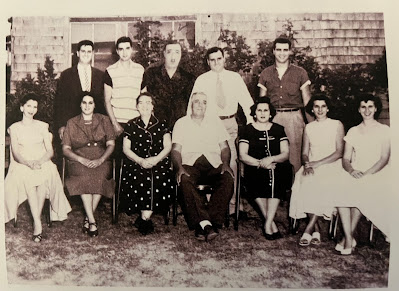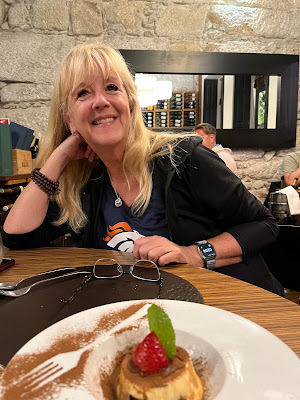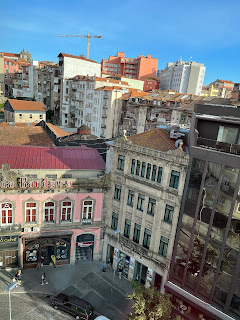Bascilica de Santa Maria la Mayor
Sunday, October 9, 2022
Pontevedra, Galicia, Spain.
I went to church today.
It’s Sunday, and I’m an Episcopal priest, so that shouldn’t come as a great surprise.
There is a surprise, however, even for me. I was supposed to be on the Camino trail. Instead, another part of The Camino called to me. The part that wasn’t marked.
The more I thought about what I was going to be doing today – skipping the Very Large Hill – the more I realized that what I would be doing for ½ the day would be spending it inside the van. Reading. And, listening to Audible books. And, meditating. And, napping.
And, the more I thought about that, the more I thought I needed to go to church. And, explore more of Galicia – specifically, the “Pontevedra boa vila” – The Good City of Pontevedra.
So, I simply told my fellow Peregrino my plans which they blessed and I blessed them and the day opened up in different ways for us both.
I was a bit late for mass at Bascilica de Santa Maria la Mayor. Which was fine. I really didn’t understand a lot of what was said, although, thanks to “the shape of the liturgy” I could figure out my place in it – which was pretty much as an observer in a liturgical museum.
Now, the liturgy and music were – straight up, no question – perfection. Which was the problem. I don’t think liturgy is supposed to be perfect. I’m a really big proponent of the Ancient Rule of the Modern Acolyte: “It’s all fun and games until something goes wrong, and then, it’s hilarious.”
Respectful, of course. And there are clearly times for solemnity. But I have to say that it gives me the heebie-jeebies when everything is perfect.
I mean, I’ve been in some pretty stuffy nosebleed high Anglo-Catholic churches where the liturgy was pristine but it was also pretty clear that the humans were doing their best.
Like, when the crucifer was about to sneeze because the incense was especially pungent (get that image in your head – pretty hilarious, right?).
Or, when the wee-little person who was the boat bearer just couldn’t take her eyes off the bird which had flown into church through an open window and she was being gently but firmly guided by the hand of Thurifer on her shoulder to the altar.
Or, when one of the torch bearers had a face that looked like the last 100 miles of his life had been pretty rough – because they had – and yet there he was, in a lovely, white, clean, starched alb, holding the torch like it was the most significant, most expensive thing he had ever held in his thick, beefy hands – because it probably was.
You know, human stuff. It makes worship a bit more real. More accessible. More – dare I say it? – inclusive, and, I’m obviously not talking specifically about issues and language of gender.
This was none of those things. Which was fine. The language was enough of a barrier. And, I knew I wouldn’t be invited to Eucharist, and, in this case, I didn’t feel welcome enough to even consider breaking the(ir) rule.
It felt good just to be wandering around on my own. Listening. Listening. Listening. Following where I was being called – or lead – or, nudged.
In a pew under a beautiful picture of the Blessed Virgin Mary, I saw a momma teaching her young daughter how to bless herself. Over in one of the side pews, under an incredible sculpture of one of the stations of the cross, I saw a papa teaching his young son how to say the rosary.
This was all going on while “Father” was up there, prating on and on about whatever it was he was saying. I figured, if it wasn’t worth listening to in Spanish, it probably wasn’t worth trying to break my brain with translation.
Which got me thinking again about the institutional church. I honestly wonder why we work so hard to continue its survival. I mean, near as I can figure, many bishops are still coming ‘round, beating the dead twin horses of “vitality and sustainability” while showing absolutely no evidence of role modeling on the diocesan level, or providing any metrics to define or measure success.
They and their staff get all excited about “new models of ministry” but those who attempt them are pretty much like a tight-rope walker, high above the norm, carefully balancing with the long pole of expertise and political finesse, skill and creativity, and all without a net!
I don’t see too many in the institutional church contributing to the “vitality and sustainability” of Christianity. Indeed, it’s pretty much just the opposite. The institutional church, like most institutions, seems pretty much invested in its own life and longevity.
And the result? Well, it’s fairly predictable: mediocrity.
So, there I was, in the midst of this outrageously-expensive-to-repair, crumbling architecture which was originally designed to give glory to God through its beautiful shape and form, its art and liturgy and music while a mom and a dad were sitting in the pew, passing along the ancient forms of Christian praise and prayer to their children.
It was, I think, what the Camino called me to pay attention to today.
I was also able to get about 6 miles of walking in today, all around the city. Not bad. My feet don’t hurt. My calves are not pounding. My head doesn’t hurt.
It was a good day.
A good Camino.
A multo Buen Camino.

















